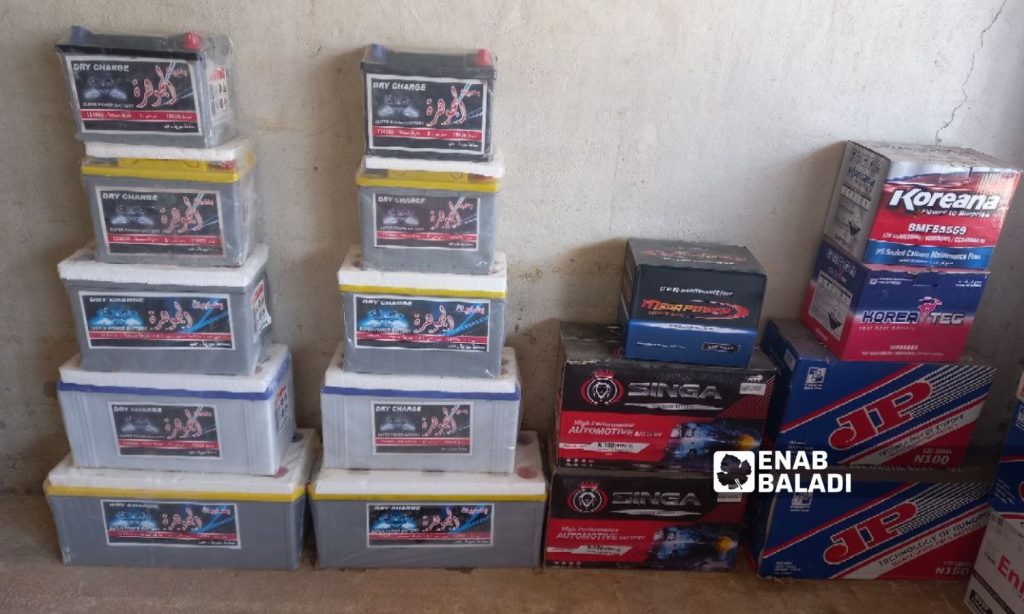Enab Baladi – Halim Muhammad
The local markets in the southern Daraa governorate witnessed a significant increase in the prices of car batteries, which are used due to the deteriorating economic conditions as a substitute for electricity for lighting or powering the necessary electrical tools at home.
The price of the battery varies according to its type and origin, and the price of the 100-ampere battery ranges between 450,000 and one million SYP, and the price of the 150-ampere battery ranges between 750,000 and 1.5 million SYP, while the prices of some imported types reach about $1000.
Demand for “Syrian battery”
Qassem, 50, owner of batteries and power panels store, told Enab Baladi that there are many types of batteries, including those imported from Vietnam, Korea, India, and China.
These types are of high price and high quality, and their price is linked to fluctuations in the exchange rate of the dollar against the pound. There are also batteries made in Syria that are cheap, but their quality is low.
Qassem (Enab Baladi withheld full name for security reasons) added that the demand for batteries of Syrian origin is greater than that of imported ones due to their low price compared to others whose acquisition is limited to well-off people and car owners, as the car owner is keen to buy a good battery to ensure continuous operation of the engine.
While some residents tend to buy batteries of Syrian origin for lighting and home services, according to the store owner.
($1=9000 SYP) according to the S-P Today website, which covers the trading rate of the Syrian pound to the dollar.
Regarding the high prices of batteries, Samir Dakak, a member of the Damascus Provincial Council, told the local newspaper al-Watan on May 23 that the prices of batteries have increased by 25% compared to the prices at the beginning of this year and range between 500,000 and 7 million Syrian pounds, depending on the type and capacity.
Dakak demanded the imposition of supply control over the prices of batteries, as it is easy to check the prices and the import certificate and request invoices for the cost price and the selling price.
He pointed out that there is a discrepancy in prices from one shop to another, with rates ranging between 300,000 and 400,000 SYP.
Used batteries
The lowest price for a battery is about four times the minimum salary for a government employee in regime-held areas.
The inability of residents to secure the price of a new battery in light of electricity rationing of up to twenty hours per day prompted them to buy used batteries.
Some people sell batteries when their energy is low to renew them, such as those who use them to operate electrical tools such as refrigerators and washing machines, as well as for cars that always need a battery of excellent efficiency.
After his home battery failed, Anas, who works as a daily worker for a wage of 15,000 SYP, was obliged to buy a used battery at a price of 100,000 Syrian pounds.
Anas, 38, said that in order to secure lighting for his house in the western countryside of Daraa, he bought a battery with half its life from a new car owner, but it is only used for lighting as it is no longer suitable for operating a screen or a fan.
Whereas Khaled was unable to buy a battery, so he resorted to buying candles. He told Enab Baladi, “We went back decades, my family used to light the lamp with a battery, and now I am unable to buy a battery.”
The battery needs daily charging to operate the lighting at night, and the majority of the population relies on solar panels to charge it, which provides energy during the peak of the sun.
Despite repeated promises, the electricity sector in regime-controlled areas did not witness any improvement; on the contrary, it worsened.
The armed conflict resulted in severe damage to 4 of 14 power stations, which amounted to about 18% of the electrical capacity throughout Syria before 2011, according to a research study prepared by scholars Dr. Sinan Hatahet and Dr. Karam Shaar.
The last 12 years have exacerbated the service conditions related to electricity to a large extent in Damascus, as the per capita share of the state’s electricity consumption has become 15% of what it was in 2010, according to the study.

